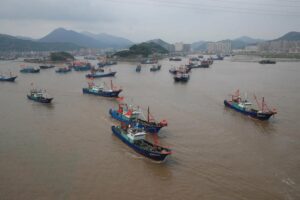Russia Turns to Increased Fishing Business with China in Light of Fukushima
In light of China’s ban on Japanese seafood imports, Russia is looking to expand its fishing business with the People’s Republic. The Russian food authority, Rosselkhoznadzor, has confirmed that talks are underway with Chinese authorities to facilitate approvals for additional Russian export companies and vessels. The goal is to increase the export of Russian seafood to China and expand the overall volume of exports. “The Chinese market is generally very promising for Russian fishery products,” the authority stated on Friday evening.
Japan recently began releasing treated radioactive water from the damaged Fukushima nuclear power plant into the ocean, as the storage tanks are reaching their capacity. Japanese officials claim that the filtered and heavily diluted water meets internationally accepted contamination standards and poses no risk to human health or the environment.
The International Atomic Energy Agency (IAEA) has also given its approval, stating that the water meets international standards and that its impact on humans and the environment is “negligible.” According to Kyodo news agency on Saturday, Japan’s fisheries agency reported that no trace of the radioactive isotope tritium was found in fish in the affected waters.
However, this action by Japan has drawn sharp criticism from Pacific Rim countries, which fear that the water could contaminate their food supply. Prior to this, there were already restrictions on Japanese imports, and now the Chinese government has banned the import of seafood from ten Japanese prefectures, including Fukushima and Tokyo. Japan is concerned about the significant loss of income, as China is its largest importer of Japanese seafood.
Environmental activists have also voiced their concerns. In the South Korean capital, Seoul, 50,000 people took to the streets to protest and urge their government to prevent a potential catastrophe resulting from the water release. Activists worry that not all potential consequences have been considered. “No one knows what it will mean for the marine ecosystem in 100 years,” said one of the demonstration organizers. South Korea does not see any scientific issues with Japan’s decision.
According to Rosselkhoznadzor, China was already the largest buyer of Russian seafood products, including salmon, herring, cod, and crab, during the period from January to August. The talks with China aim not only to expand exports but also to discuss food safety issues. The currents in the Pacific Ocean off Russia’s Far East, where 70% of Russian catches are made, prevent contamination of fish and seafood.




























































